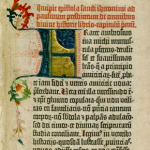In my Protestant ministry days, I remember reading a book ‘Emerging Voices in Global Christian Theology.’ The book dealt with the growing input in Christianity (Evangelical style) from other non-Western cultures. Not just the famous liberation theology of which everyone has heard. But different takes on Christian doctrines and practices from different parts of Asia, Africa, South America, you name it. The big message was, beware the hyphenated Christian, as a professor I had once said. Beware assuming the way I do Christianity is just what Jesus was thinking when he handed the keys to Peter. Resist the temptation to believe that everyone else is somehow adding an extra-doctrinal spin on what the True Gospel is all about (that is, how I do Christianity).
I’m thinking of that as I follow the unfolding comments over at Mark Shea’s Catholic and Enjoying It. Mark posted a rather scathing assault on Trad Catholics. At one he says most are ‘repellent specimens’. Harsh language. Far harsher than most Protestants I know would have used against other Christians. In fact, most Evangelicals I knew wouldn’t have referred to Catholics that way! I know he qualifies this by stating that he knows plenty of Traditional Catholics who are good and decent people, but see below.
In the comments, strange and bizarre discussions break out. For my part, I keep asking just what a Traditional Catholic is. Apparently, I’m told, it’s nothing that is in keeping with Mark’s terminology. Rad Trads, a term coined by Sandra Miesel, suggests those who fully reject Vatican II, though not all do. I’m also informed that not all Traditionalists are these ‘Rad Trads.’ And yet Mark does not use the term ‘Rad Trad’, he uses Trad Catholics. Does that mean Traditionalist? Does it mean Radical Traditionalist?
Here’s the thing. It’s dangerous to hyphenate Christianity because it usually leads to the belief that it’s a good thing God didn’t make me like those people over there. Especially if you aren’t taking on the label of a particular approach to Catholicism yourself. If you think Group A Catholics are generally bad news, do you consider yourself part of Group B? Can we analyze the meaner parts of Group B and suggest you are suspect? First problem. In the end, most of us probably don’t hang our credentials on some arbitrarily defined group. Most of us are Midwestern Accent types.
What do I mean by that? The first time I ever traveled abroad I was shocked to find others from other parts of the country who immediately recognized that I was from the Midwest. How did they know? Easy, they said. They could tell by my Midwestern accent. But I didn’t have an accent! I just spoke the normal way! Everyone else in America had an accent, not me. Southerner, New Yorkers, New Englanders, Amity Islanders, Texans of course – they had the accents, not me.
Well, turns out to others, we have the accent. Us Ohioans have an accent that’s a dead giveaway Funny that. Same thing with Christianity. Yes, there were groups. I belonged to an Evangelical tradition. Evangelical in this point defined the second of about three ways it could be defined. Most, of course, didn’t see themselves as part of a mere approach, certainly not part of whatever bad elements others saw when they think ‘Christian Evangelical’. Some didn’t even think the term should apply! Most didn’t see themselves as Fundamentalists, or Fundamentalists Extremists (which might include, among other things, the belief that only the King James Bible was the true Word of God). Most weren’t mainline either, meaning Presbyterians, Anglicans and the like. Liberal or conservative was a bit sketchy, and it depended on what you meant. Most were probably conservative, but not all. And not all voted Republican. As a general rule, since most post-Reformation Protestantism is a factor of American society, most in my churches considered their own American brand as the default Christianity against which others were measured, even if they could never clearly define just what approach they were part of.
Nonetheless, I was always careful to remind folks that we should be careful about applying our own yardstick to other expressions of Christianity. Didn’t mean we couldn’t note the differences. And to be brutally honest, it didn’t mean we couldn’t point out obvious problems. Sometimes it wasn’t hard to find racism in more fundamentalist oriented traditions, especially in the South. It may not be flagrant, but it was there. Harsh and sometimes judgmental terminology would sometimes be used in dealing with such issues as homosexuality. Those were facts. Not always, but it happened.
But here’s the ugly secret. When you’re a pastor, like it or not, you get to see some of the meaner sides of church living. You may not like it, but you see and find out quite a lot. I’ll never say all the things I saw or heard, simply because it was in pastoral confidence and even anonymous quotes feel like betraying some of the more sensitive confessions I heard. But let me say this: ours was not the tradition of angels. The people, if not as outward in their defining characteristics, were still as flawed, as imperfect, as sinful as any fundamentalist waving a KJV, and pining for separate water fountains for African Americans.
Therefore, remembering that was a good way to remember that other cultures or approaches are probably not any worse than any we identify with. Our approach to the faith is not the one against which others are measured, the one that leads to better types of people. I have no problem believing there are approaches to the Catholic faith that have their issues. I’m sure that approach vaguely known as Rad Trad has its problems. And I’m damn sure that the approach that is embraced by those who used the term Rad Trad has its problems. If the approach isn’t what causes it, then those within the approach are probably just as problematic when the dust settles. Therefore, caution should be used.
Again, this doesn’t mean we can’t disagree, or point out why Catholics who chafe at Vatican II are wrong headed. That’s fair in love and Church. But we must be careful. If we are going to group people together, we should claim a group ourselves and be prepared to be judged accordingly. In the end, it’s best to single out a quote or a person, rather than use a quote by a single person to single out a group. If someone says they don’t want a witch doctor for a Pope, suggesting strong racial undertones, then deal with the quote and the person who made it. Feel like it’s too common among Catholics of a particular group? That’s fair, but be prepared to hear where other approaches might fall short, including our own, which no doubt is the real Catholicism that doesn’t have an accent.














